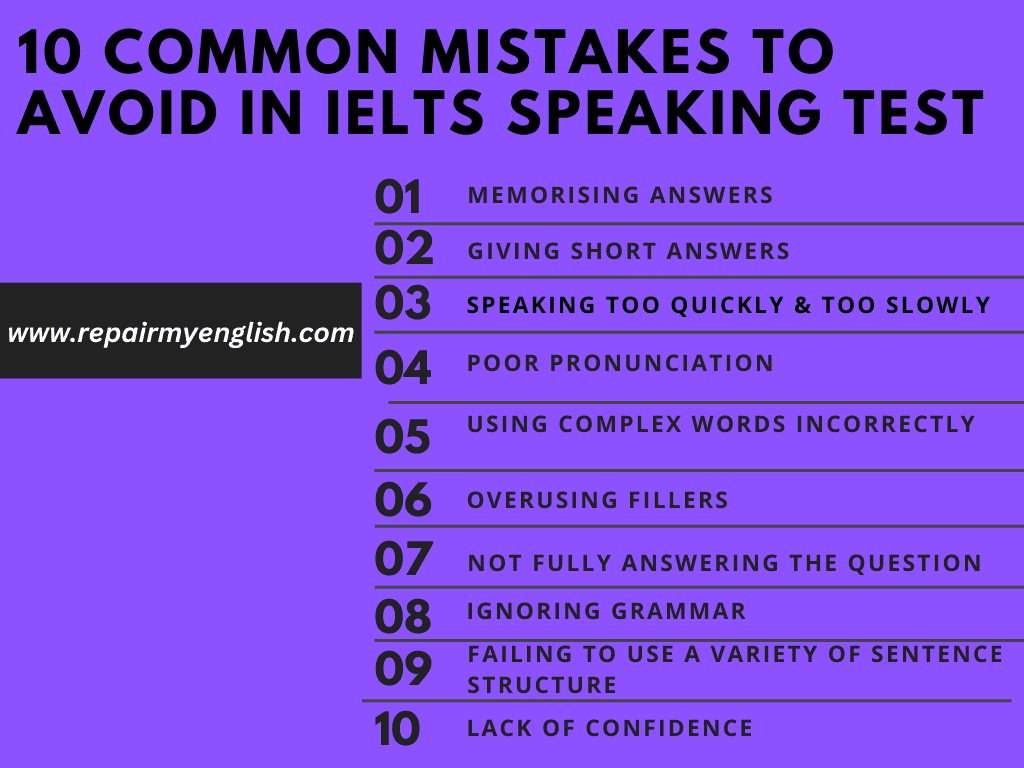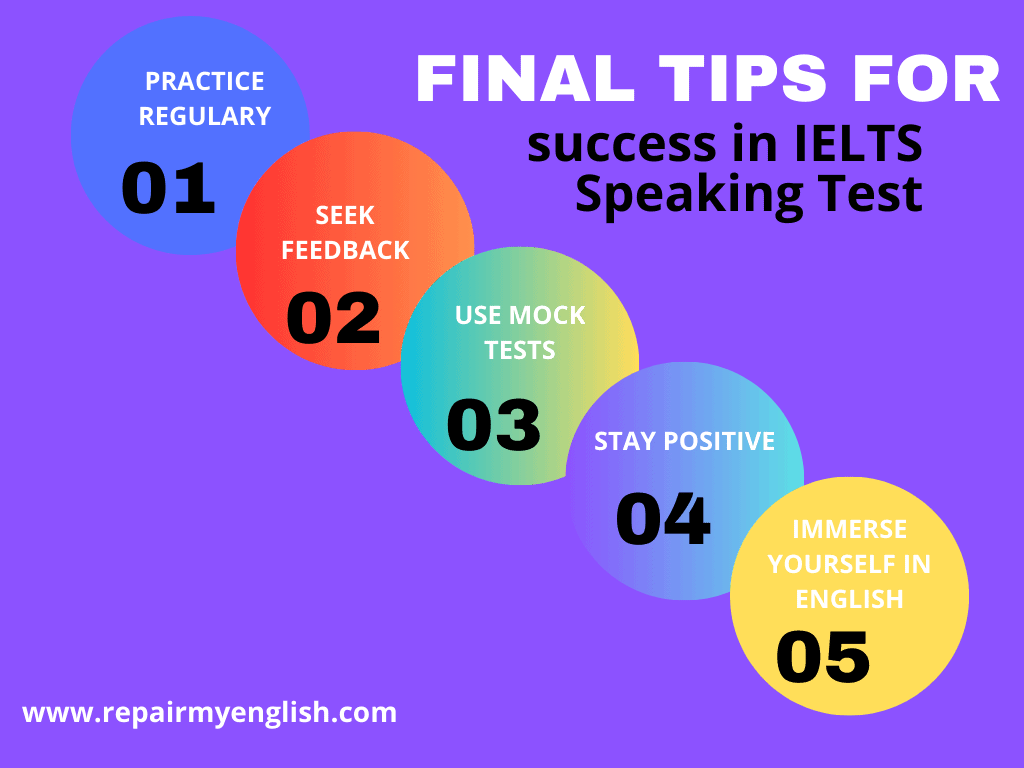The IELTS Speaking Test can be difficult for those students who want to achieve a high band score. A lot of students unknowingly make mistakes that result in obtaining low scores. In this blog, you will learn the top 10 mistakes students generally make in the IELTS Speaking Test and how you can avoid such mistakes to score high on the test.

1. Memorizing Answers
Why It’s a Problem:
In the IELTS Speaking Test, the examiners are trained to identify the memorized answers. If your answer doesn’t align with the question or sounds you have crammed the answer, it may result in a low band score. Memorized Answers are not spontaneous; that’s why examiners can easily find that out in your response.
Let’s learn how to fix this mistake in the IELTS Speaking Test:
- Rather than memorizing the answers completely, you should practice the common question types.
- You can share personal experiences to make your answers sound natural. For example, if the examiner asks you about your favourite book, tell her why you like that book and what you have learned from the book instead of giving a mugged-up response.
- If you practice regularly, you can build the habit of thinking and speaking naturally in English.
2. Giving Short or One-Word Answers
Why It’s a Problem:
- The examiner can’t assess your language ability if you give short or one-word answers. Such answers can lead to low band scores in the IELTS exam.
- If you give short and one-word answers during your IELTS speaking test, the examiner can’t assess your language ability. Therefore, you won’t be able to score high bands in the speaking test.
Let’s learn how you can avoid this mistake:
- Don’t just give “Yes” or “No” responses in the IELTS Speaking test. Explain your answers to the examiner. By explaining the answers, the examiner can understand how effectively you can frame sentences in English and assess your fluency accordingly.
- Follow: Point, Example and Explanation Structure while preparing for the IELTS Speaking Test. This structure will help you give spontaneous responses.
- Record your responses while you practice for the IELTS Speaking exam. This way, you can assess your responses whether they were detailed or not.
3. Speaking Too Quickly or Too Slowly
Why It’s a Problem:
- If you speak slowly, the examiner will think that you lack confidence level. On the other hand, if you speak too quickly, the examiner can miss vocabulary words and can’t understand your answers thoroughly.
Let’s learn how to fix this mistake in the IELTS Speaking test:
- When you are answering, try to maintain a steady pace.This will show the examiner that you are comfortable with the language and also show your confidence level.
- You can practice with a stopwatch while preparing for part 2 Question types. It can help you finish your answer within the time limit of 1 or 2 minutes, and you will learn how to maintain a consistent speed.
- You can also record your answers to find out whether you maintain a steady pace or not. Further, you can listen to native speakers and mimic their pace to sound more spontaneous.
4. Poor Pronunciation
Why It’s a Problem:
- Mispronouncing words in the IELTS Speaking test can lead you to a low score on the exam. Pronunciation-related problems can occur for various reasons, such as incorrect stress, intonation, and individual sounds.
Let’s learn how to avoid this mistake:
- You can practice tongue twisters to improve your pronunciation. Besides this, you can also do a read-aloud activity, which can help you not only with the correct pronunciation of the words but also with your intonation and pace.
- You can take feedback from an IELTS instructor or a native speaker who can help you identify and correct your pronunciation mistakes.
- Learning from online resources like YouTube tutorials and pronunciation apps like ELSA Speak or Speechling can help you fix your pronunciation problems.
5. Using Complex Words Incorrectly
Why It’s a Problem:
- Misusing the vocabulary can negatively impact your band score. If you use the vocabulary in the wrong context, your sentence will be difficult to understand.
Let’s learn how to fix this mistake in the IELTS Speaking test:
- It is recommended not to use advanced vocabulary if you are not entirely sure how to use it in the sentence.
- You can learn collocations if you want to improve your vocabulary. Collocations are generally those words that are paired together. Learning them and using them in the proper context can help you achieve a high band score in the IELTS speaking exam.
- You can also learn new words and use them in different scenarios. This way, you become confident in using the words in different contexts.
6. Overusing Fillers
Why It’s a Problem:
- If you use fillers excessively, you will not sound confident or spontaneous.
- Fillers like “um”, “uh”, or “you know” can disrupt the flow of your speech and create a hindrance to your fluency.
Let’s learn how to avoid this mistake:
- You can record yourself so that you can identify how frequently you use the fillers in your speech. If you find out that you are overusing them, then you can replace them with specific phrases like “Let me think about that”, or you can say, “It is a difficult question to answer”. Such responses sound more spontaneous and don’t interrupt your fluency.
- You can use adequate pauses while you speak. Pauses can help you to transition from one idea to the other. And it doesn’t disrupt your fluency.
7. Not Fully Answering the Question
Why It’s a Problem:
- Incomplete answers can confuse examiners as they lack clarity. That’s why they can negatively impact your score.
Let’s learn how to fix this mistake in the test:
- During the IELTS Speaking test, you should listen to the question carefully. For instance, if your examiner asks you, “What do you like about your city? You can talk about the landmarks and cuisines that are popular in the city. You can also mention its cultural, historical, and spiritual significance.
- You can also use the “WH” framework that stands for “Who, What, When, Where and Why”. This framework can help you generate various ideas in your mind, and you will never feel out of content.
- Practising mock questions on different topics can help identify whether you cover all parts of the prompt or not. If you receive feedback from your instructor or friend on your answer, it will also help you to refine your answers.
8. Ignoring Grammar
Why It’s a Problem:
- Many students think that grammatical mistakes are not counted in the IELTS Speaking Test. However, Grammar is one of the significant factors in the exam, which you shouldn’t ignore because incorrect Grammar can cost you a low band score on the IELTS exam.
Let’s learn how to avoid this mistake:
- Focus on simple sentence structures rather than directly jumping towards complex ones.
- Practice past, present, and future tenses a lot, as they help you frame sentences.
- You can also focus on the topics like Prepositions, Conjunctions and subject-verb agreement. Working on them will definitely help you score high bands on the exam.
9. Failing to Use a Variety of Sentence Structures
Why It’s a Problem:
If you only use simple sentences while you speak, it will show that you are not comfortable using the language effectively. That’s why it is essential to include compound and complex sentences that show variety.
Let’s learn how to fix this mistake:
- Try to include more compound and complex sentences in your answers. Instead of using simple sentences like: “I like reading books”, you say, “I like reading books as it helps to improve my knowledge on a variety of subjects.”
- You can also include coordinating, subordinating and correlative conjunctions to add variety to your sentence structures. This will not only help you improve your fluency but also show how effectively you can communicate in the language.
10. Lack of Confidence
Why It’s a Problem:
- Confidence plays a crucial role in the IELTS exam. It helps you to sound comfortable and spontaneous with the language. And indirectly improves your band score.
Let’s learn how to avoid this mistake:
- You need to face a mock IELTS Speaking Test as many times as possible.This will help you to remain confident during your final exam, and you will feel less nervous.
- You can also practice with a timer and record yourself. It will help you to make optimum use of your time to answer your questions.
- You can practice breathing techniques if you have nervousness issues. But you need to practice breathing techniques at least 1 month before the exam because using only on the day of the exam is not going to help you in any way.
Final Tips for Success in the IELTS Speaking Test:
- Practice Regularly: Dedicate 15 minutes every day for speaking practice. If you practice consistently for a month or so, it will drastically improve your fluency and confidence level.
- Seek Feedback: You can take coaching classes and get feedback from your IELTS instructor. If you are preparing at home, then you can get help from your friends who are good in English.
- Use Mock Test: Mock Test helps you to practice under exam conditions. This will help you learn how effectively you can use time under exam conditions.
- Stay Positive: Don’t be afraid to make mistakes during exams. It is normal to make mistakes, and if you make one, then don’t worry about it too much. Stay positive and move on.
- Immerse Yourself in English: Limiting yourself to the IELTS content is not sufficient if you want to achieve a high band score. You need to watch English Movies and seasons and listen to TED talks and podcasts to improve your performance.
By avoiding these common mistakes in the IELTS speaking test and implementing these strategies, you’ll be better equipped to achieve a high band score on the test. With dedication and consistent effort, success is within your reach. Good luck!
Read related blogs:
IELTS Listening Tips: 10 Strategies for Guaranteed Success
IELTS Writing Tips and Tricks: 10 Strategies for Assured Success
10 IELTS Reading Test Tips and Tricks to Achieve 8+ Band Score


